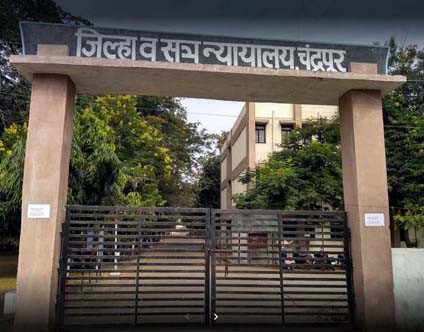
Much-needed Structure for Chandrapur District Court finally Sanctioned

The Government of Maharashtra has recently sanctioned 16 new buildings across the State, each one costing more than Rs. 15 Crores. This includes the construction of new building for the Chandrapur District and Sessions Court. A meeting of a High-Level Committee was called recently to sanction the new constructions to be implemented by the PWD.
The Chandrapur District and Sessions Court is one of the busiest courts in Vidarbha catering to a population of more than 22 lakh people spread across 15 talukas of the district. It is a court where, on an average, more than 3000 cases are filed annually. The existing structure was not big enough for the burgeoning work of the court and needed extension. For the past several years there was an increasing demand for extension of the existing infrastructure. The President of the Bar Association Adv. Abhay Pachpore, Vice-President Adv. Rajesh Thakur and Secretary Adv. Ashish Dharmapuriwar and other office-bearers are being congratulated by the legal fraternity for their successful follow up on this matter with the Government of Maharashtra.
In the important case All India Judges Association vs. Union of India, the Hon’ble Supreme Court of India ordered that District and Sessions Courts should not be referred to as ‘Subordinate Judiciary’ because these are important pillars of the justice mechanism in the country. The District Court enjoys original jurisdiction and wide powers to address the concerns of the ordinary people who knock on its doors to have their grievances heard and matters addressed.
According to the Hon’ble Apex Court, “The District Courts and courts forming a part of the district judiciary discharge a prominent role in preserving the rule of law. Public confidence in the judicial system sustains the credibility of the judiciary. The district judiciary has a significant role in generating and fostering public confidence. The standards of ethics and professionalism expected on judges are more rigorous than those applied to other services/professions. Ensuring adequate emoluments, pension and proper working conditions for the members of the district judiciary has an important bearing on the efficiency of judicial administration and the effective discharge of the unique role assigned to the judiciary.”
The order of the Chief Justice of India in the above-mentioned case has pointed out the long-standing problem of disregarding the voluminous work that the district judiciary performs in the country and the steady service that it has provided over decades even under conditions of utter neglect as far as minimum infrastructure is concerned. In the past, Chief Justice T.S Thakur became emotional on public stage while begging the government to take cognizance of the abysmal level of infrastructure of district judiciary and do something about it.
In our country we have a tendency to grade everything according to a hierarchy whether these are public education and healthcare systems, railway coaches, waiting rooms, guest houses or bureaucracy and police and the lower levels in this hierarchy invariably have terrible infrastructure. This is probably a colonial hangover because colonialism required a weak lower level to ensure that the higher level remained strong and in centralized control over resources. Judicial set up is also a victim of colonialism in which lower courts have bad infrastructure but as we move up the ladder the infrastructure gets progressively better. The remarks of the current CJI and the implorations of the erstwhile CJI are commendable instances when things were put in perspective.
In fact, the government should make it their top priority to provide decent infrastructure during this Amrit Mahotsav of India’s independence. After all this independence can only sustain and strengthen itself through a strong and independent judiciary. Sociologists have shown that decent and inspiring workplace leads to better work culture, enhancement in performance and obliterates hierarchy and affliction of showing the ‘superior-subordinate’ through provision of mere infrastructural facilities.
Providing such infrastructure is not difficult for the government, because after all nobody is asking for the moon. What do we mean by infrastructure? As far as district lawyers are concerned, basic infrastructure means a hall where there is a roof over their heads and where they can set a table and a chair to sit and confer with their clients. Unfortunately, even this basic expectation is not made available today and lawyers are forced to sit in front of toilets. It is a travesty of the system that lawyers not only have to bring their own tables and chairs but have to chain these for the fear that someone will purloin these. It is the plight of the district lawyer that a desk and chair put by them in the lobby can be confiscated by the court administration, and for that matter, even chair and table in front of bathroom can be confiscated. Things are in such desperate conditions that clean washrooms, internet facility, state of art technology, air conditioners, fans, coolers, auditoriums, conference rooms are a far cry.
For courts suffering under such conditions, the observations of the CJI have come as a great solace and source of hope. In the glorious tradition of Chandrapur Bar which has produced legendary lawyers whose pleadings have been appreciated by the Apex Court, a small step towards infrastructure improvement will go a long way in providing a good workplace and sprucing up the morale of those who work there.
Dr. Kalyan Kumar
(He is a practicing lawyer in Chandrapur District Court and Nagpur High Court.)


